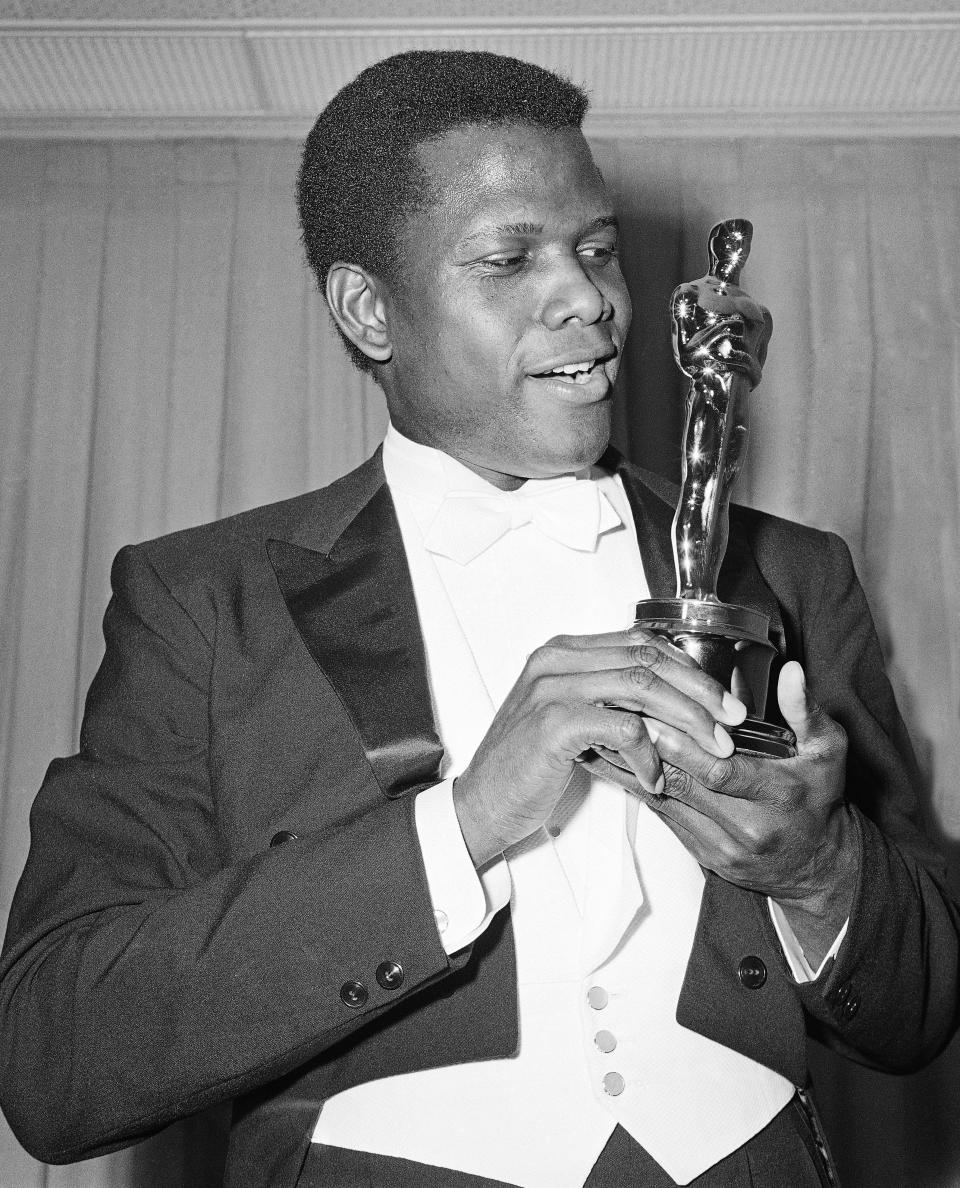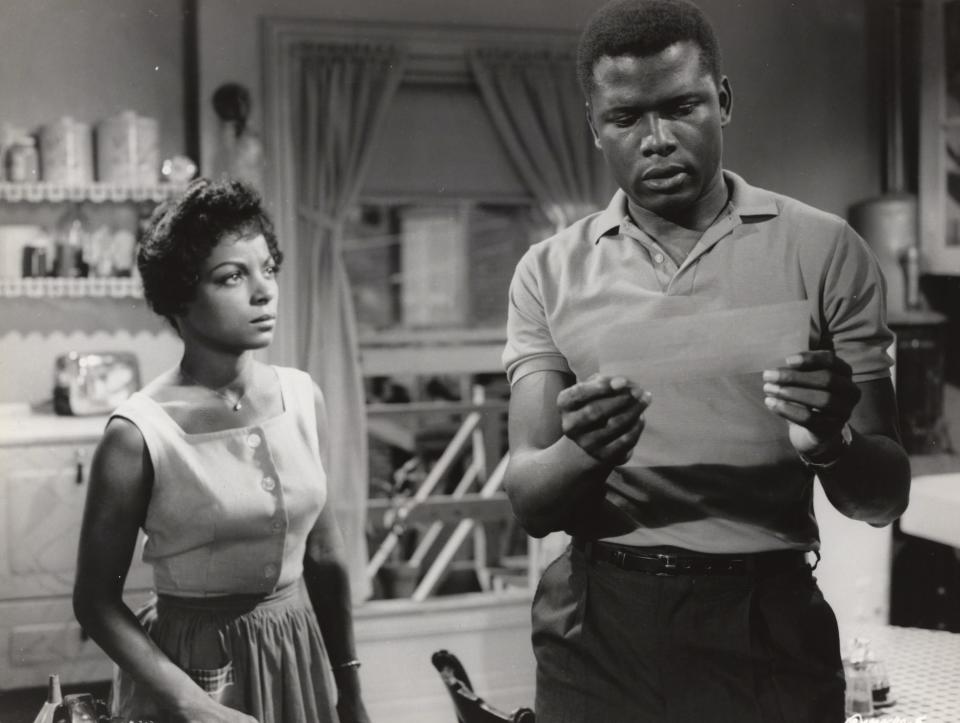Legendary actor Sidney Poitier portrayed Black men with the dignity they have off screen
- Oops!Something went wrong.Please try again later.
- Oops!Something went wrong.Please try again later.
Correction: This column has been updated to note that Hattie McDaniel won the Oscar for best supporting actress.
Quiet dignity. That’s what I think of when I reflect on the life of groundbreaking actor Sidney Poitier. Representation in the media looks very different now than when I was growing up. Role models on television were hard to come by. The one Black person who had been awarded an Academy Award for acting before Sidney Poitier was Hattie McDaniel, who won the Academy Award for best supporting actress for her comedic portrayal of Mammy in 1939's "Gone With the Wind."
McDaniel certainly opened doors, but the role she played reinforced painful stereotypes. For a long time, Blacks were casts in stereotypical roles involving criminals, slaves or mammy – an issue explored in the series "They’ve Gotta Have Us." Poitier, who died Thursday at the age of 94, presented to a world often consumed with stereotypes a different image of Black culture.
Before Poitier, the few positive images focused on lighter-skinned Black musicians and entertainers like Lena Horne and Diahann Carroll. Poitier had beautiful dark skin and portrayed distinguished characters. Escaping stereotypical roles in Hollywood as an actor is nearly impossible, yet he managed to do it. The characters he portrayed were often elegant and educated, and they always had dignity. They were role models.
Movies that matter
He made history as the first African American man to be nominated for an Academy Award (for "The Defiant Ones" in 1958) and the first to win in 1964 for best actor for his portrayal as a handyman, Homer Smith in the movie "Lilies of the Field."
When most people recall Poitier, they speak of "Guess Who’s Coming to Dinner," a groundbreaking movie (both thematically and in content – he was the first Black actor to kiss a white actress on the screen) that addressed race and interracial relationships in 1967, the same year that the Supreme Court decided Loving v. Virginia, which found that laws banning interracial marriage were unconstitutional.

Poitier was involved in movies that mattered. Although other notable films include "In the Heat of the Night" (1967) and "They Call Me Mister Tibbs" (1970), my favorite was "To Sir, with Love" (1967). Poitier played a teacher to trouble-making kids in an all-white classroom. The iconic scene where he tells the students how he is to be addressed and how they should act was inspiring. He commanded the respect of his students while mesmerizing the audience.
It is hard to watch Poitier and not hold your chin a bit higher and straighten your posture. In short, he made me proud. He made so many of us proud – of him individually and the Black community. He was elegance personified.
And actor, and activist, to be proud of
My admiration for Poitier is not limited to his impact on the screen but also his impact in the Black community. For a while, Poitier was in the uncomfortable position of being the only Black person in the room. A position that many of us still experience today. Poitier made sure he would not be the last. Poitier was committed to civil rights, along with his friends Harry Belafonte and James Baldwin, and participated in the March on Washington, where Dr. Martin Luther King Jr. gave his iconic "I Have A Dream" speech.
For me, one of Poitier's greatest legacies is that he was committed to lifting others as he climbed.

Poitier made his community proud in every role he played, as a director, as a role model, as an activist. He possessed that quiet dignity that I have seen in many Black men, particularly my uncles. It is a strength and dignity rarely portrayed in Hollywood – even now, at a time where there is greater representation. It took four decades before another Black man, Denzel Washington, would win the 2001 Academy Award for best actor and acknowledged that he was following in Poitier’s footsteps: "I'll always be following in your footsteps. There's nothing I'd rather do, sir."
An old African proverb says we stand tall because we stand on the shoulders of our ancestors. Poitier was a gift that birthed dreams in people who continue to break barriers and inspire others. I will never know all he had to go through to open those doors, but I can’t imagine that we would have experienced the brilliance of Denzel Washington, Morgan Freeman, Laurence Fishburne, Will Smith, Courtney B. Vance, Chadwick Boseman, Spike Lee, Cuba Gooding Jr., Robert Townsend, John Singleton or Jordan Peele – just to name a few – if there had not first been a Sidney Poitier.

Poitier stood for something other than his own self-interest. His legacy surpasses his list of film credits. At a time when we have said farewell to other principled actors from that time period like Cicely Tyson and Betty White, may we all strive to stand for something positive beyond ourselves.
Njeri Mathis Rutledge, a professor of law at South Texas College of Law Houston and a member of USA TODAY's Board of Contributors, is a former prosecuting attorney, a wife and a mother. She graduated from Spelman College and Harvard Law School. Follow her on Twitter: @NjeriRutledge
You can read diverse opinions from our Board of Contributors and other writers on the Opinion front page, on Twitter @usatodayopinion and in our daily Opinion newsletter. To respond to a column, submit a comment to letters@usatoday.com.
This article originally appeared on USA TODAY: Sidney Poitier: Black America follows in legendary actor's footsteps

